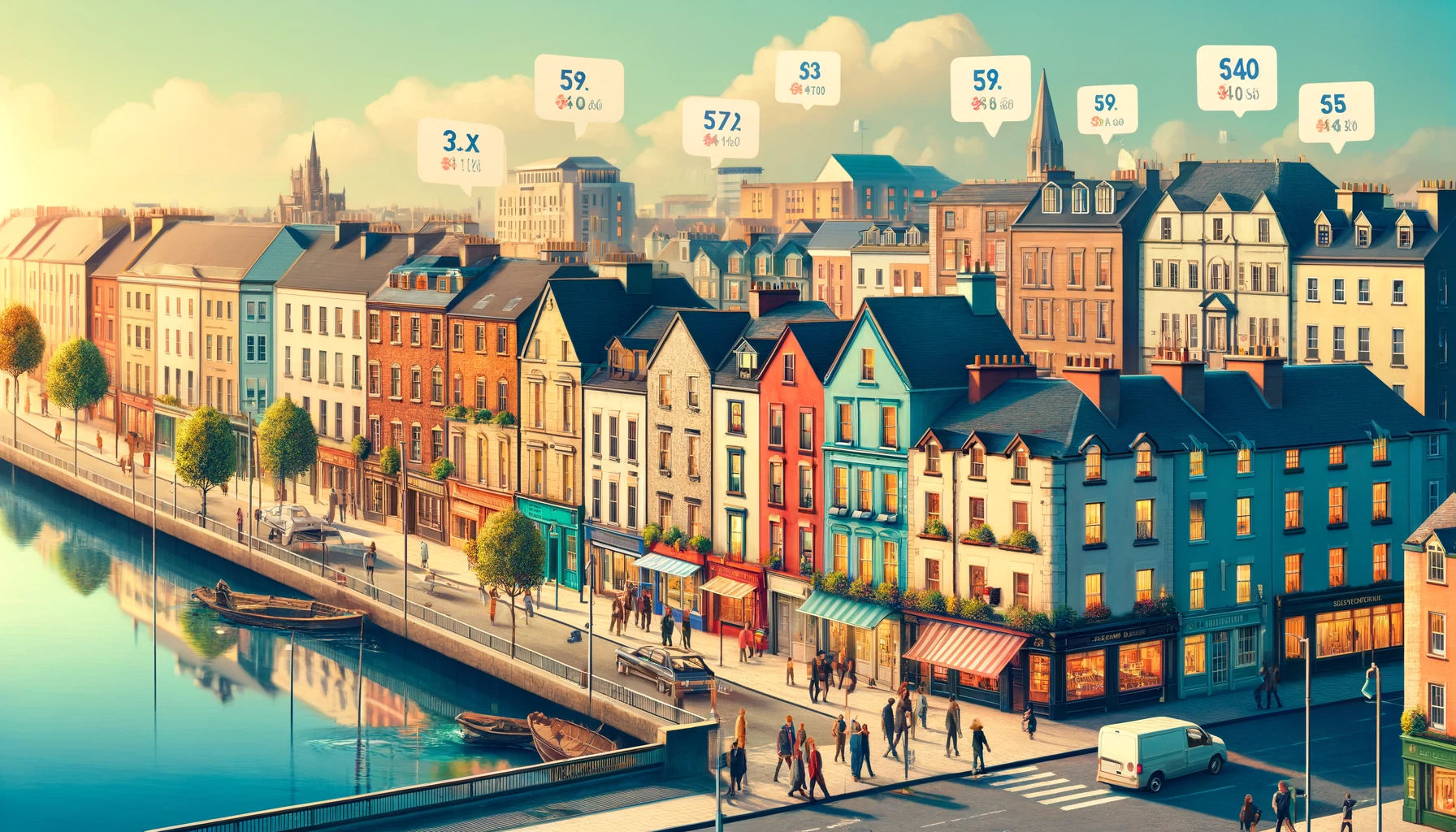Yes, Cork, Ireland is considered moderately expensive. The city offers a range of living costs that can suit different budgets, although expenses like housing, dining, and entertainment tend to be on the higher side. Public transportation and groceries provide some relief, being more affordable. The overall cost of living in Cork is influenced by lifestyle choices and specific locations within the city.
From my experience, balancing costs in Cork is about making informed choices. Opting for local markets and regular public transport use has helped manage my budget effectively. Participating in the free cultural events the city has to offer also enriches living here without adding financial strain. How does this compare to your expectations or experiences in similar cities?
How Much Does Housing Cost in Cork?

Housing costs in Cork vary widely depending on the area and type of property. As of 2024, the average price for purchasing a home in Cork city is approximately €350,000. Apartments in the city center typically cost around €300,000, while larger family homes outside the center can be higher, often reaching upwards of €400,000.
Renting in Cork also reflects a range of prices, influenced heavily by location and property size. On average, a one-bedroom apartment in the city center rents for about €1,300 per month. A similar apartment outside the city center generally costs around €1,000 per month. For larger properties, such as three-bedroom houses, monthly rents in the suburbs can exceed €1,800.
These housing costs contribute to Cork's reputation as a moderately expensive city in Ireland, particularly in comparison to smaller towns and rural areas, but still more affordable than Dublin.
What are the Average Rent Prices in Cork Per Month?

The typical monthly rent for a one-bedroom apartment in the Cork city center is approximately €1,300, while similar accommodations outside the city center average around €1,050. While similar accommodations outside the city center average four estimated monthly costs of around €1,050. For larger living spaces, such as a three-bedroom apartment, rents in the city center average about €2,200 per month, and slightly less outside the center at around €1,800.
These figures highlight Cork's position as an affordable option compared to Dublin but still a substantial expense for residents and newcomers. Rent costs are a pivotal factor when assessing whether Cork is expensive, and they play a crucial role in budgeting for potential movers. The market data shows a steady demand for housing, influenced by Cork's growing reputation as a vibrant economic and cultural hub.
How Expensive is Dining Out in Cork?

Dining out in Cork, Ireland, is moderately expensive, with prices that reflect the city's bustling culinary scene. The cost of a meal at an inexpensive restaurant typically ranges from €12 to €20, while a three-course meal for two at a mid-range restaurant can cost between €50 and €70. These prices are slightly above the national average, positioning Cork as a city with a somewhat higher cost of dining out compared to other cities and regions in Ireland.
Local specialties like fresh seafood and artisanal cheeses often carry a premium, enhancing the dining experience but also adding to the expense. Additionally, international cuisine in Cork is diverse, with offerings from Italian to Asian, which can vary widely in price depending on the restaurant's location, history and reputation.
Overall, while Cork offers a variety of dining options, the cost can be steep, especially for restaurants in popular tourist areas and for diners seeking high-quality ingredients and unique culinary experiences.
How Do Prices Compare Between Budget and High-End Dining?

Prices between budget and high-end dining in Cork, Ireland, show a significant disparity. A typical meal at a budget restaurant might cost around €15 to €20 per person. In contrast, dining at a high-end restaurant can set you back by at least €50 to €80 per person, depending on the choice of dishes and the restaurant's prestige.
Additionally, the cost for a three-course meal in a mid-range restaurant averages between €35 single person and €55 per person. This indicates that while budget dining remains quite affordable, luxury dining experiences in Cork reflect the city's culinary diversity and can be considerably more expensive.
Drinks also vary widely in price. A domestic beer in a casual pub might cost around €4 to €5, whereas the same at a high-end bar could be priced at €7 to €9. Similarly, wine prices at upscale venues typically start at about €7 per glass, a significant increase from more modest establishments.
Overall, the cost of living in terms of dining out in Cork is manageable but escalates notably when opting for finer dining experiences. This variation reflects Cork's ability to cater to both budget-conscious diners and those seeking a gourmet experience.
How Much Does Public Transportation Cost In Cork?

A standard single bus fare within Cork city costs approximately €2.40, while a day pass, which offers unlimited travel, is priced at about €4.50. For regular commuters, a monthly pass can be purchased for around €80, providing significant savings for daily travel.
The Cork City Bus Service, operated by Bus Éireann, is the primary mode of public transport and covers extensive routes throughout the city and its suburbs. Additionally, there are train services connecting Cork to major Irish cities, with the cost of a one-way ticket to Dublin typically around €19 to €50, depending on the booking time and service class.
Given these prices, public transportation in Cork is affordable and provides a cost-effective alternative to driving, especially considering the high costs of parking and fuel in the city. Thus, while not exceptionally cheap, the public transportation system in Cork offers good value for its efficiency and comprehensive network.
How Can You Save Money on Transportation In Cork?
Saving money on transportation in Cork can be straightforward if you explore a variety of cost-effective options. Whether you prefer public transportation, walking, cycling, or carpooling, there are several ways to reduce your travel expenses. Here are ten practical tips to help you save money while getting around Cork efficiently.
-
Use Public Transportation: Cork has an efficient public transportation system, including buses and trains. Opt for buses operated by Bus Éireann or trains for longer distances to save on travel costs. Purchase a Leap Card for discounted fares on buses and trains.
-
Walk or Cycle: Cork is a walkable city with many attractions located close to each other. Consider walking or cycling to get around. Invest in a good pair of walking shoes or a bicycle. Cork also has a bike-sharing scheme called Coke Zero Bikes.
-
Carpooling: Sharing rides with friends, colleagues, or using carpooling apps can significantly reduce transportation costs. Use carpooling apps like BlaBlaCar to find people travelling the same route.
-
Use Ride-Sharing Services: Apps like Uber or Lyft can be more cost-effective than traditional taxis, especially if you share rides with others.
-
Buy Monthly or Annual Passes: If you use public transportation regularly, consider purchasing a monthly or annual pass. These passes typically offer a substantial discount compared to single-ride tickets.
-
Travel Off-Peak: Fares for public transportation can be cheaper during off-peak hours. Plan your travel during these times to take advantage of lower rates.
-
Student Discounts: If you are a student, make sure to take advantage of student discounts available for public transportation. Carry your student ID to avail these discounts.
-
Explore Discount Cards: Look into travel discount cards that offer reduced fares for frequent travelers. These can be particularly useful if you commute daily.
-
Plan Your Routes Efficiently: Use apps and online resources to plan the most efficient routes. This can help you avoid unnecessary trips and save on transportation costs.
-
Use Electric Scooters: Consider using electric scooters available for rent in Cork. They are an affordable and fun way to get around the city, especially for short distances.
What Is the Cost of Living in Cork for a Student?
The cost of living in Cork for a student typically varies depending on lifestyle and accommodation choices. Generally, a student in Cork can expect to spend between €800 and €1,200 per month. This estimation includes rent, groceries, transportation, and occasional entertainment.
Rent is the most significant expense, with shared accommodation ranging from €400 to €600 per month. Living closer to university campuses can increase rent costs slightly. Utilities, including the internet, usually add an additional €30 to €50 to monthly expenses.
Transportation costs are moderate, as most essential services and educational institutions are centrally located. A monthly pass for public transport costs around €50 to €70. However, many students opt for cycling, significantly reducing this expense.
Groceries for a student will generally cost about €150 to €200 monthly, depending on dietary preferences and food alone. Eating out and social activities will add approximately €100 to monthly expenses, although many places offer student discounts.
Overall, while Cork is not the cheapest city in Ireland for international students but, careful budgeting can make living expenses manageable.
Is Cork Expensive Compared To Other Other Irish Cities?
Yes, Cork is considered expensive compared to other Irish cities. In 2024, the cost of living in Cork remains relatively high, positioning it as one of the pricier cities in Ireland.
Rent in Cork is significantly high, with average monthly costs for a one-bedroom apartment in the city center around €1,500 per week, which is only slightly less than Dublin, Ireland's most expensive city. Utilities and groceries in Cork also mirror this high cost trend, often surpassing prices found in smaller Irish cities like Limerick and Galway.
Transportation costs, including bus fares and the price of gasoline, are comparable to those in Dublin, further contributing to the overall expenses faced by residents. Dining out and entertainment in the town of Cork, while vibrant and diverse, also reflect a higher price tag, making it less affordable than many other parts of Ireland.
In summary, while Cork offers a rich cultural experience and a dynamic lifestyle, it does so with a cost of living that is above average when compared to other Irish cities.
Is Cork More Affordable Than Dublin?
Yes, Cork is more affordable than Dublin. The cost of living in Cork is generally lower compared to Dublin, which is the most expensive city in Ireland. Housing in Cork costs about 20% less than in Dublin, where average rent for a one-bedroom apartment in the capital city and center is around €2,000 per month, compared to Cork’s €1,600. Groceries and dining out are approximately 10-15% cheaper in Cork. Additionally, transportation and general living expenses also tend to be lower in Cork, providing a more economical alternative for residents and expatriates alike. Overall, Cork offers a cost-effective option for those looking to live in Ireland while managing expenses effectively.
Is Cork Expensive Than Galway?
Yes, Cork is generally more expensive than Galway. As of 2024, the cost of living in Cork is higher due to its larger population and status as a significant economic hub in Ireland. Rent in Cork, for example, averages about 20% higher than in Galway. Additionally, everyday expenses such as groceries, dining out, and transportation also tend to be slightly more costly in Cork.
Utilities in Cork, including electricity, heating, and internet, can be about 10% more expensive compared to Galway. Despite these higher costs, Cork offers extensive employment and business opportunities, particularly in technology and pharmaceutical sectors, which can offset the higher living expenses for many residents.
Overall, while Cork offers a vibrant city environment with many cultural and professional advantages, these come at the cost of a higher living standard compared to the more relaxed and scenic Galway.
Is Cork Cheaper Than Limerick?
Yes, Cork is generally more expensive than Limerick. As of 2024, the cost of living in Cork is approximately 10-15% higher compared to Limerick. This difference is particularly evident in housing costs, where Cork's rental prices are notably higher. For example, the average rent for a one-bedroom apartment in the city center of Cork can be around €1,400 per month, while in Limerick, the same kind of apartment averages about €1,200 per month.
In addition to housing, daily expenses such as groceries, gas bill dining out, and transportation also contribute to Cork’s higher cost of living. Grocery prices in Cork are roughly 5-8% more than in Limerick, and dining costs follow a similar pattern. However, both cities offer various options to manage these expenses, depending on one’s lifestyle and budget.
Transportation costs are also slightly higher in Cork, with monthly public transport passes costing around €80, compared to approximately €70 in Limerick. These differences highlight Cork as a more expensive option, influenced by its larger population and higher demand for services and amenities.
FAQs On Is Cork Ireland Expensive?
1. Is living in Cork, Ireland expensive?
Yes, Cork is considered moderately expensive. The cost of living typically reflects urban living costs in Ireland, which are substantial but manageable.
2. How do housing expenses in Cork compare to other Irish cities?
Housing expenses in Cork are high but generally lower than in Dublin. Rent and property prices in Cork offer better value compared to the capital.
3. What are typical daily expenses in Cork?
Daily expenses in Cork, such as groceries and public transportation, are reasonably priced. Dining out and entertainment can increase your monthly costs significantly.
4. Is healthcare expensive in Cork?
Healthcare in Cork is affordable, especially with public health insurance. Private healthcare services may cost more, similar to other parts of Ireland.
5. Can students afford to live in Cork comfortably?
Students can live comfortably in Cork with proper budgeting. Many educational institutions provide resources for affordable living options.
